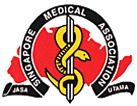
THESMANEWS
Present Issue
Past Issues
Journals
Present Issue
Past
Issues
Letters to the Editor

BE UNCHOKED
The free market sentiment in healthcare, if taken too literally may have suboptimal outcomes that are not only not cost effective but may also produce choke points in the system.
Should everybody compete and disregard the idea of gatekeeping? Worldwide, there is enough evidence that the primary care gate-keeper system has been found to be cost effective in keeping national healthcare costs down. This may explain why the healthcare cost per capita in America is double to that in the United Kingdom.
Of course, it is also important to recognise that there is a need for gate-keepers to be well trained to do the job. And there should also be national education and reaffirmation that this type of help seeking behaviour is desired. To a great extent, the gate-keeper system has been in place in the Singapore healthcare delivery system and also promoted. There was a television commercial some years back ran by the Ministry of Health that encouraged patients to see their family doctors for a cough and cold and reserve only serious problems for the hospital specialist. We should not lose this paradigm in the heat of competition.
But gate-keeping is not enough. There is a need to integrate the different levels of healthcare: outpatient and hospital. Many GPs lament that a referral of a patient to hospital can be a painful experience. The article by Dr Wong Sin Hee is a case in point (N6). He was choked with anguish. Could there be better co-ordination of care and mutual respect? There is a need to develop that in Singapore, notwithstanding the paradigm of competition. Other GPs observed that their referred patients did not come back or were shunted to the Government Polyclinic, to be discovered months later when the patients, for various reasons decide to return to their GPs. Perhaps the hospital colleagues should take a bigger effort to find out if the patients were referred by his/her GP and return them to their GPs. It will mean fewer outpatient follow-ups and relieve the unnecessary choking of full clinics.
With restructuring, there may be an incentive for the hospital to keep the patients so that the numbers are kept up because subvention is related to numbers. The result is a burgeoning medical officers’ outpatient clinic, where many could have been referred and followed up by their GPs. The SOC may well become choke points of the public healthcare delivery system. With fewer patients and patients deserving their care, more attention could be paid to their medical problems. The opportunity to develop the high end medical skills is not choked out by numbers.
The move of hospitals into primary care has been an evergreen topic and a source of unhappiness to the GP community. This requires reflection. What should be the role of the hospital? The answer is tied up with the national aspiration to be the medical hub in the region.
The regional hub paradigm is much talked about. To succeed in this, there is a need to recognise certain fundamental concepts. Countries will welcome expertise that complement their services and not services that compete with what they already have. They will welcome opportunities to hone their existing skills. In drawing up our regional hub blueprint, we should aim to provide services that will complement and integrate with the existing services in the countries we hope to serve. Training and sharing of medical, professional and management expertise will always find a place. Straight service will be much less sought after, unless it is truly world class.
We should therefore aspire to produce world class doctors as a nation.
Perhaps, the different restructured hospitals should think of cooperation
to reach this national dream instead of competing amongst themselves, spilling
into primary care and choking their skills with work that could be done
better by other players in the health care delivery system. Think about
this.